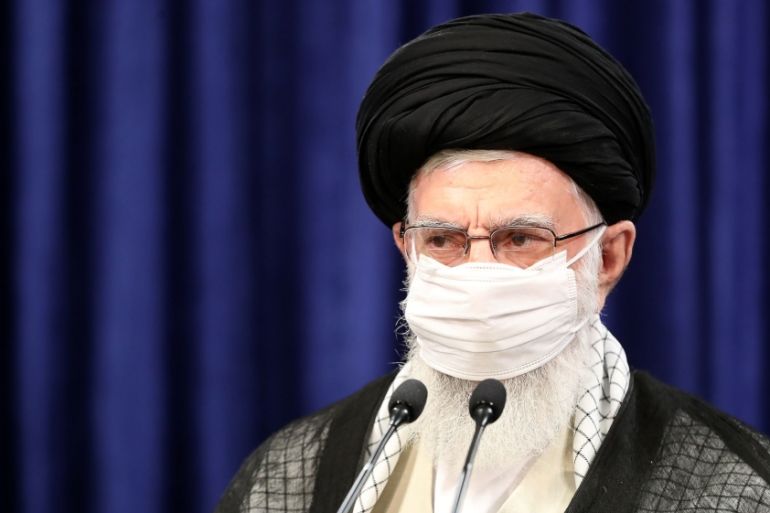Iran’s Khamenei accuses US of trying to stoke protests
Iran’s Supreme Leader has ruled out negotiations with Washington, saying Trump would only use talks for propaganda.

Iran’s Supreme Leader Ayatollah Ali Khamenei has accused the United States of trying to stir anti-government protests by imposing sanctions that he said are aimed at bankrupting the country.
Iran’s rulers have tried to prevent a revival of anti-government unrest that has shaken the country in recent years, which began with protests over economic hardship but turned political, with demonstrators demanding top officials step down. Authorities have said street protests will be dealt with “decisively”.
“Their [The US] short-term goal was to make our people so fed up and tired that they would stand up against the (ruling) system,” Khamenei said in a televised speech on Friday marking the Muslim religious holiday of Eid al-Adha.
“Their long-term aim is to bankrupt the country, the state, in other words to make the economy collapse.”
In addition to the US sanctions, Iran’s economy has been hit by a fall in oil prices, as well as the coronavirus crisis. Iran has one of the highest death tolls in the Middle East from the pandemic.
Negotiations ruled out
Relations between Tehran and Washington have deteriorated since 2018 when US President Donald Trump abandoned Iran’s 2015 nuclear deal with six powers, under which Tehran agreed to curtail its nuclear programme in return for the lifting of most international sanctions.
The Trump administration has said it is willing to talk to Iran “with no preconditions”, but that the US will continue its campaign of pressure against the nation.
|
|
Khamenei called the US Iran’s “main enemy” and urged Iranians to resist US pressure. He ruled out negotiations with Washington saying Trump would use talks for propaganda as he did with North Korean leader Kim Jong Un.
“At the negotiating table, America wants us to abandon our nuclear industry altogether, reduce our defence capabilities and relinquish our regional influence,” he said.
Since pulling out of the nuclear deal, Washington has reimposed sanctions that have sharply lowered Tehran’s oil exports and imposed sanctions on its access to the international banking system. It has pressured allies and rivals alike to fall in line as well.
“This has caused the country’s economy to be naturally less reliant on oil,” Khamenei said, casting the development in a positive light.
Iran later responded to the US’s withdrawal from the deal by slowly abandoning nearly every aspect of the agreement, though it still allows UN inspectors access to its nuclear sites.
‘Maximum pressure’
The US has been pursuing a “maximum pressure” policy aimed at forcing Tehran to negotiate a broader deal that further limits its nuclear work, ends its missile programme and its support for proxy forces in a regional power struggle with US-backed Gulf countries.
“There is no doubt that sanctions are a crime,” Khamenei said.
“But the smart Iranian has made the best use of this attack, this animosity and benefited … by using sanctions as a means to increase national self-reliance.”
|
|
Khamenei said Western “think-tanks admit that the maximum pressure (policy) of sanctions and US force has not succeeded”.
He also accused European partners to the nuclear deal of “having done nothing” to provide Iran with the economic benefits of the accord and said their barter system designed to bypass US sanctions was a “useless plaything”.
The system, called Instex, is meant to function as a clearinghouse and allow European companies to deliver medical supplies to Iran without being exposed to sanctions.
The United Kingdom, France and Germany announced they had carried out the first transaction through the mechanism in late June, more than a year and a half after it was established.